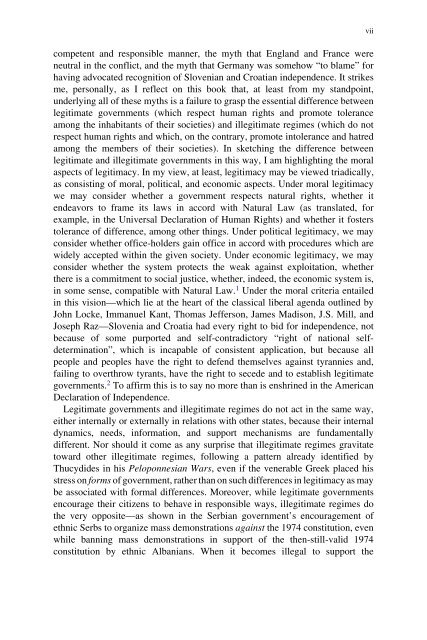Yugoslavia: A History of its Demise - Indymedia
Yugoslavia: A History of its Demise - Indymedia
Yugoslavia: A History of its Demise - Indymedia
Create successful ePaper yourself
Turn your PDF publications into a flip-book with our unique Google optimized e-Paper software.
competent and responsible manner, the myth that England and France were<br />
neutral in the conflict, and the myth that Germany was somehow “to blame” for<br />
having advocated recognition <strong>of</strong> Slovenian and Croatian independence. It strikes<br />
me, personally, as I reflect on this book that, at least from my standpoint,<br />
underlying all <strong>of</strong> these myths is a failure to grasp the essential difference between<br />
legitimate governments (which respect human rights and promote tolerance<br />
among the inhabitants <strong>of</strong> their societies) and illegitimate regimes (which do not<br />
respect human rights and which, on the contrary, promote intolerance and hatred<br />
among the members <strong>of</strong> their societies). In sketching the difference between<br />
legitimate and illegitimate governments in this way, I am highlighting the moral<br />
aspects <strong>of</strong> legitimacy. In my view, at least, legitimacy may be viewed triadically,<br />
as consisting <strong>of</strong> moral, political, and economic aspects. Under moral legitimacy<br />
we may consider whether a government respects natural rights, whether it<br />
endeavors to frame <strong>its</strong> laws in accord with Natural Law (as translated, for<br />
example, in the Universal Declaration <strong>of</strong> Human Rights) and whether it fosters<br />
tolerance <strong>of</strong> difference, among other things. Under political legitimacy, we may<br />
consider whether <strong>of</strong>fice-holders gain <strong>of</strong>fice in accord with procedures which are<br />
widely accepted within the given society. Under economic legitimacy, we may<br />
consider whether the system protects the weak against exploitation, whether<br />
there is a commitment to social justice, whether, indeed, the economic system is,<br />
in some sense, compatible with Natural Law. 1 Under the moral criteria entailed<br />
in this vision—which lie at the heart <strong>of</strong> the classical liberal agenda outlined by<br />
John Locke, Immanuel Kant, Thomas Jefferson, James Madison, J.S. Mill, and<br />
Joseph Raz—Slovenia and Croatia had every right to bid for independence, not<br />
because <strong>of</strong> some purported and self-contradictory “right <strong>of</strong> national selfdetermination”,<br />
which is incapable <strong>of</strong> consistent application, but because all<br />
people and peoples have the right to defend themselves against tyrannies and,<br />
failing to overthrow tyrants, have the right to secede and to establish legitimate<br />
governments. 2 To affirm this is to say no more than is enshrined in the American<br />
Declaration <strong>of</strong> Independence.<br />
Legitimate governments and illegitimate regimes do not act in the same way,<br />
either internally or externally in relations with other states, because their internal<br />
dynamics, needs, information, and support mechanisms are fundamentally<br />
different. Nor should it come as any surprise that illegitimate regimes gravitate<br />
toward other illegitimate regimes, following a pattern already identified by<br />
Thucydides in his Peloponnesian Wars, even if the venerable Greek placed his<br />
stress on forms <strong>of</strong> government, rather than on such differences in legitimacy as may<br />
be associated with formal differences. Moreover, while legitimate governments<br />
encourage their citizens to behave in responsible ways, illegitimate regimes do<br />
the very opposite—as shown in the Serbian government’s encouragement <strong>of</strong><br />
ethnic Serbs to organize mass demonstrations against the 1974 constitution, even<br />
while banning mass demonstrations in support <strong>of</strong> the then-still-valid 1974<br />
constitution by ethnic Albanians. When it becomes illegal to support the<br />
vii
















